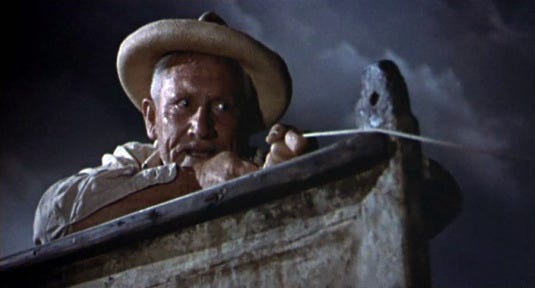The Old Man and the Sea (1958)
"It is better to be lucky, but I would rather be exact. Then when luck comes you are ready."
This, to me, is the central motif of "The Old Man and the Sea." Based on Ernest Hemingway's iconic novella, it's the story of a poor, tired old failure of a fisherman who has one big last hurrah trying to land the mother of all fishes.
I'm sure most everyone is familiar with the story, a staple in high school English classes: The old man goes 84 days without catching a fish, becoming the laughingstock of his small Cuban seaside village. On the 85th day he hooks a giant marlin, and spends two days battling it until he finally kills it. But then sharks come and eat the entire fish before he can tow it home.
The tale is about pride and humility, hopefulness versus regret, and the battle between usefulness and the creeping infirmity of age. But mostly, I think, it's about fate versus choice.
Santiago, the old man played by Spencer Tracy -- who looks about as Cuban as I do Japanese -- does not listen to the taunts of the villagers that he is unlucky, because to him it is preferable to be prepared and experienced and decisive than to trust to blind luck.
He does not, however, deny the existence of luck. When the boy (Felipe Pazos), who used to fish with him but was ordered by his parents to find a more lucrative captain, expresses a desire to rejoin Santiago, the old man refuses. You have a lucky boat, he says, and should stay with it.
But for him, the old fisherman would rather spend months going out to sea every day doing things the right way and come back empty-handed, than to rely on fate to deliver him a daily bounty. Better to starve with honor than look to the heavens for your reward.
After it becomes clear that his trip will become a disaster, Santiago blames not God or the fish -- whom he calls his "brother" -- but himself. I went out too far, he says, knowing that his pride would not let him cut his line and let the great fish go. Now his hands are rent from grasping the line for days on end, he is nearly dead from exhaustion and sunstroke, and has lost most of his good fishing lines, his harpoon and even his sturdy knife.
In the end the man is defeated, but not broken. Because man can never truly be defeated, he ponders, merely destroyed. The fact that he was willing to risk all, and lose it, in pursuit of the catch of a lifetime lends him glory that an easy victory never could.
The 1958 film, made six years after publication of the book, is a faithful adaptation -- virtually a word-for-word copy of Hemingway's dialogue and prose -- that is not without its faults.
Tracy is solid in the lead role, earning yet another Best Actor Oscar nomination. But even director John Sturges would admit it was his sloppiest work from a technical perspective.
Unable to capture live fishing footage of a great marlin, Sturges resorts to loads of stock footage that he splices unconvincingly with Tracy's work in a water tank at Warner Bros' Burbank studio. The magnificence of James Wong Howe's cinematography, shot on location, only serves to underline the glaring juxtaposition of the canned stuff.
Interestingly, the film was one of the first to use blue-screen technology in which live actors are inserted in front of a previously shot background. The technique would require further refinement to be convincing.
Finally, the marlin itself was a rubber dummy that looked like ... well, a big rubber fish.
Watching "The Old Man and the Sea," I'm reminded of other films about solitary men on quests: "Cast Away," "The Spirit of St. Louis." They also seem to me to have as their essential theme this question of man's endeavors challenging the capriciousness of chance.
It's only in testing ourselves, and persevering not just through adversity but through failure, that we grasp beyond our ruddy humanity.
4 Yaps




